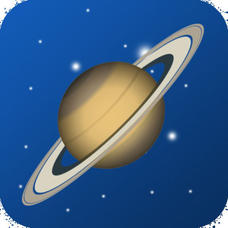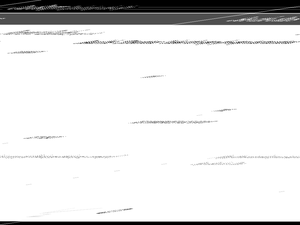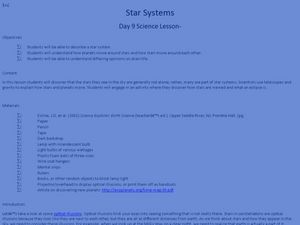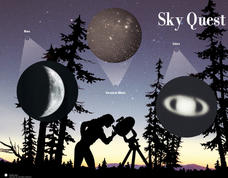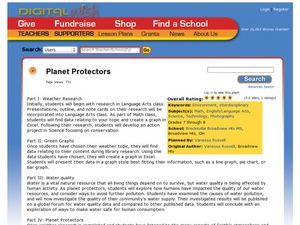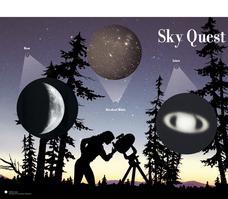Curated OER
Comparing Planets in our Solar System to Stars
In this solar system worksheet, students complete a Venn diagram by comparing and contrasting the characteristics of planets and stars.
University of Colorado
Looking Inside Planets
All of the gas giant's atmospheres consist of hydrogen and helium, the same gases that make up all stars. The third in a series of 22, the activity challenges pupils to make scale models of the interiors of planets in order to...
Q Continuum
Planets
Have you ever looked up at the night sky and wondered what constellation you were seeing or whether that bright object was a star or a planet? Are you searching for the best tilt-to-view constellation and planet app that money can't buy?...
Glynn County School System
Solar System Formation and Extra-Solar Planets
Has the solar system always been like it is today? A lesson presentation begins with a discussion of the formation of our solar system. It continues with a compare and contrast of the inner and outer planets.
Curated OER
The Sun, Moon, and Our Solar System: Teacher/Student Notes
Introduce basic Earth and space science to your budding astronauts. This handout works in two ways, the first part provides information about the sun, moon, eclipses, and Earth to be read to or by the class. The second part is composed...
Curated OER
The Planet Mars
Fifth graders gain knowledge about Mars and Earth. For this compare and contrast lesson, 5th graders use visual representations of the solar system to observe the characteristics of the planets. Students read fiction and nonfiction...
media.yurisnight.net
Science Lesson Plan: Our Solar System: I Wonder?
Ever wonder why Pluto isn't considered a planet? Or how large the Earth is compared to the other inner planets? Explore the universe with a series of projects that simulate different aspects of our solar system. The activities require...
Curated OER
Space Words and Comparatives
Which is bigger: the sun or the moon? Which is nearer: the planets or a star? English Language Learners first located a series of space-related nouns and adjectives in a word search, and then identify the comparative and superlative...
Curated OER
Organic Molecules Detected on Distant Planet!
Here is a planet worksheet in which learners read about organic molecules detected through spectral lines of the planet Osiris. They calculate the mass, the volume and the densities of common ingredients for planets including Osiris and...
Curated OER
Two Views of the Universe
Students build the two models of the universe created by Aristotle and Copernicus. They compare and contrast the two universes. They create hypothesis on how each model functions.
Curated OER
Puzzling Planets
Students examine the concept of a solar system. In this research based lesson, students compare a star and a planet. They explain the requirements for life in a biosphere.
Curated OER
See the Stars
Students explore the nighttime sky. In this space science lesson plan, students read the book Maria's Comet and and investigate the sky using their naked eyes. Students compare the view of their naked eyes to the view of a telescope.
Curated OER
Star Wars: Modernity and the Timelessness of Myth
Students explore myths through the study of multiple texts. Students use James Joyce's "Ulysses," the film "Star Wars," various Greek and Biblical myths to inform a guided discussion of myths and the common themes in these texts.
Space Awareness
What is a Constellation
Why do some stars in a constellation appear brighter than others? Using a get-up-and-move astronomy activity, scholars explore perspective and the appearance of constellations in the sky while developing an understanding of the...
Curated OER
Unit 2 Sun & Stars
Students describe stellar objects using terms such as stars, planets, satellites, orbits and light. In this sun and stars unit, students research stellar objects through seven individual lessons discovering star characteristics, how...
Curated OER
Star Systems
Students study a star system and see how the planets move around stars. In this star system activity students complete an activity and see what an eclipse is.
Messenger Education
Star Power! Discovering the Power of Sunlight
It takes less than 10 minutes for energy from the sun to travel 90 million miles to Earth! In the first installment in a series of four, groups measure the amount of solar radiation that reaches Earth. They then discuss how this is...
Curated OER
And a Star to Steer Her By: A Field Trip Guide for the Planetarium Show
In this field trip study guide for the planetarium show activity, students construct a model of the Earth and describe the relative positions of the continents using latitude and longitude. Students construct a star chart to find...
PBS
Data Plots of Exoplanet Orbital Properties
Scientists discovered the first exoplanet in 1995 and by early 2018, they confirmed the existence of more than 3,700—that's a lot of data! As part of the PBS 9-12 Space series, scholars interpret data about exoplanets. They compare...
Curated OER
Sky Quest
Students identify constellations in the evening sky. In this Sky Quest lesson, students create their own star patterns using a star map worksheet. Students explain how different celestial bodies in space are viewed through a telescope.
Curated OER
Planet Protectors
Young scholars explore ways to protect the earth. In this environmental issues and technology instructional activity, students investigate the water quality in their community and compare their findings to the water quality in other...
Curated OER
Sky Quest: Exploring the Constellations
Students examine constellations and planets through completing various activities. Students work individually and in groups to create drawings based on stars, compare and contrast the night sky with and without a telescope and learn...
Curated OER
Gazing At Cosmic Pinballs
Students explore the world of stars. They see that the color of a star tells how hot or cold it is, that stars come in different sizes. and that stars are moving through space. They draw lines connecting start to star.
Curated OER
Earth Science
Students explore the planets and celestial bodies in our solar system. For this outer space lesson, students identify the planets and record journal information about them and other celestial bodies. Students define outer space words.




